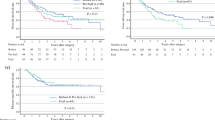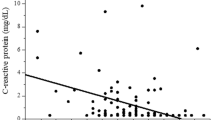Abstract
Background
The number of elderly patients with gastrointestinal cancer is rising as the population ages. This study aimed to assess the impact of a preoperative geriatric assessment on postoperative survival and to develop a geriatric prognostic scoring system (GPSS) for elderly patients.
Methods
Patients (n = 544) age 75 years or older who had undergone radical surgery for gastrointestinal cancer were recruited for this observational study. Geriatric assessments (GAs) using the Barthel Index, the Mini-Mental State Examination, Instrumental Activities of Daily Living, the Vitality Index, and the Geriatric Depression Score were administered before surgery. Multivariable analysis was performed using a Cox proportional hazard regression model to identify significant prognostic factors. The GPSS was developed using regression coefficients of the multivariable regression to predict overall survival (OS). Thereafter, 165 consecutive patients were prospectively validated to test the authors’ model.
Results
The independent predictors of OS appeared to be GA as well as age, type of cancer, clinical stage, performance status, and body mass index. The patients were classified into high- and low-risk groups according to the GPSS. The overall 3-year survival was 79% in the low-risk group and 26% in the high-risk group (hazard ratio [HR], 5.69; 95% confidence interval [CI] 4.35–7.42; p < 0.0001). Furthermore, when GPSS was applied to independent cohorts, the patients in the high-risk group showed significantly poorer prognoses than those in the low-risk group (HR, 4.49; 95% CI 2.65–7.60; p < 0.0001).
Conclusions
Geriatric assessments were closely associated with postoperative OS. The GPSS is useful in predicting postoperative prognosis and may help determine treatment strategies for elderly patients with gastrointestinal cancer.



Similar content being viewed by others
References
Brugel L, Laurent M, Caillet P, et al. Impact of comprehensive geriatric assessment on survival, function, and nutritional status in elderly patients with head and neck cancer: protocol for a multicentre randomised controlled trial (EGeSOR). BMC Cancer. 2014;14:427.
Hosking MP, Warner MA, Lobdell CM, et al. Outcomes of surgery in patients 90 years of age and older. JAMA. 1989;261:1909–15.
Turrentine FE, Wang H, Simpson VB, et al. Surgical risk factors, morbidity, and mortality in elderly patients. J Am Coll Surg. 2006;203:865–77.
Ramesh HS, Jain S, Audisio RA. Implications of aging in surgical oncology. Cancer J. 2005;11:488–94.
Epstein AM, Hall JA, Besdine R, et al. The emergence of geriatric assessment units: the “new technology of geriatrics”. Ann Intern Med. 1987;106:299–303.
Stuck AE, Siu AL, Wieland GD, et al. Comprehensive geriatric assessment: a meta-analysis of controlled trials. Lancet. 1993;342:1032–6.
Maione P, Perrone F, Gallo C, et al. Pretreatment quality of life and functional status assessment significantly predict survival of elderly patients with advanced non-small cell lung cancer receiving chemotherapy: a prognostic analysis of the multicenter Italian lung cancer in the elderly study. J Clin Oncol. 2005;23:6865–72.
Freyer G, Geay JF, Touzet S, et al. Comprehensive geriatric assessment predicts tolerance to chemotherapy and survival in elderly patients with advanced ovarian carcinoma: a GINECO study. Ann Oncol. 2005;16:1795–800.
Fukuse T, Satoda N, Hijiya K, et al. Importance of a comprehensive geriatric assessment in prediction of complications following thoracic surgery in elderly patients. Chest. 2005;127:886–91.
Dale W, Hemmerich J, Kamm A, et al. Geriatric assessment improves prediction of surgical outcomes in older adults undergoing pancreaticoduodenectomy: a prospective cohort study. Ann Surg. 2014;259:960–5.
Maekawa T, Sugimoto K, Yamasaki M, et al. Comprehensive geriatric assessment is a useful predictive tool for the duration of postoperative delirium after gastrointestinal surgery in old-old adults. Geriatr Gerontol Int. 2016;16:1036–42.
Yamamoto M, Yamasaki M, Sugimoto K, et al. Risk evaluation of postoperative delirium using comprehensive geriatric assessment in elderly patients with esophageal cancer. World J Surg. 2016;40:2705–12.
Giantin V, Valentini E, Iasevoli M, et al. Does the Multidimensional Prognostic Index (MPI), based on a Comprehensive Geriatric Assessment (CGA), predict mortality in cancer patients? Results of a prospective observational trial. J Geriatr Oncol. 2013;4:208–17.
Soubeyran P, Fonck M, Blanc-Bisson C, et al. Predictors of early death risk in older patients treated with first-line chemotherapy for cancer. J Clin Oncol. 2012;30:1829–34.
Girones R, Torregrosa D, Gomez-Codina J, et al. Prognostic impact of comorbidity in elderly lung cancer patients: use and comparison of two scores. Lung Cancer. 2011;72:108–13.
Aaldriks AA, Giltay EJ, le Cessie S, et al. Prognostic value of geriatric assessment in older patients with advanced breast cancer receiving chemotherapy. Breast. 2013;22:753–60.
Kanesvaran R, Li H, Koo KN, et al. Analysis of prognostic factors of comprehensive geriatric assessment and development of a clinical scoring system in elderly Asian patients with cancer. J Clin Oncol. 2011;29:3620–7.
Folstein MF, Folstein SE, McHugh PR. “Mini-mental state.” A practical method for grading the cognitive state of patients for the clinician. J Psychiatr Res. 1975;12:189–98.
Moons KG, Harrell FE, Steyerberg EW. Should scoring rules be based on odds ratios or regression coefficients? J Clin Epidemiol. 2002;55:1054–5.
Kirkhus L, Benth JS, Rostoft S, et al. Geriatric assessment is superior to oncologist’ clinical judgement in identifying frailty. Br J Cancer. 2017;117:470–77.
Tucci A, Ferrari S, Bottelli C, Borlenghi E, Drera M, Rossi G. A comprehensive geriatric assessment is more effective than clinical judgment to identify elderly diffuse large cell lymphoma patients who benefit from aggressive therapy. Cancer. 2009;115:4547–53.
Wedding U, Kodding D, Pientka L, Steinmetz HT, Schmitz S. Physicians’ judgment and comprehensive geriatric assessment (CGA) select different patients as fit for chemotherapy. Crit Rev Oncol Hematol. 2007;64:1–9.
Author information
Authors and Affiliations
Corresponding author
Additional information
Publisher's Note
Springer Nature remains neutral with regard to jurisdictional claims in published maps and institutional affiliations.
Electronic supplementary material
Below is the link to the electronic supplementary material.
10434_2019_7687_MOESM1_ESM.bmp
Supplementary Figure 1. Receiver operating characteristic (ROC) curves for the geriatric prognostic scoring system (GPS) scores for 1-year overall survival. (BMP 3924 kb)
Rights and permissions
About this article
Cite this article
Yamasaki, M., Maekawa, Y., Sugimoto, K. et al. Development of a Geriatric Prognostic Scoring System for Predicting Survival After Surgery for Elderly Patients With Gastrointestinal Cancer. Ann Surg Oncol 26, 3644–3651 (2019). https://doi.org/10.1245/s10434-019-07687-z
Received:
Published:
Issue Date:
DOI: https://doi.org/10.1245/s10434-019-07687-z




